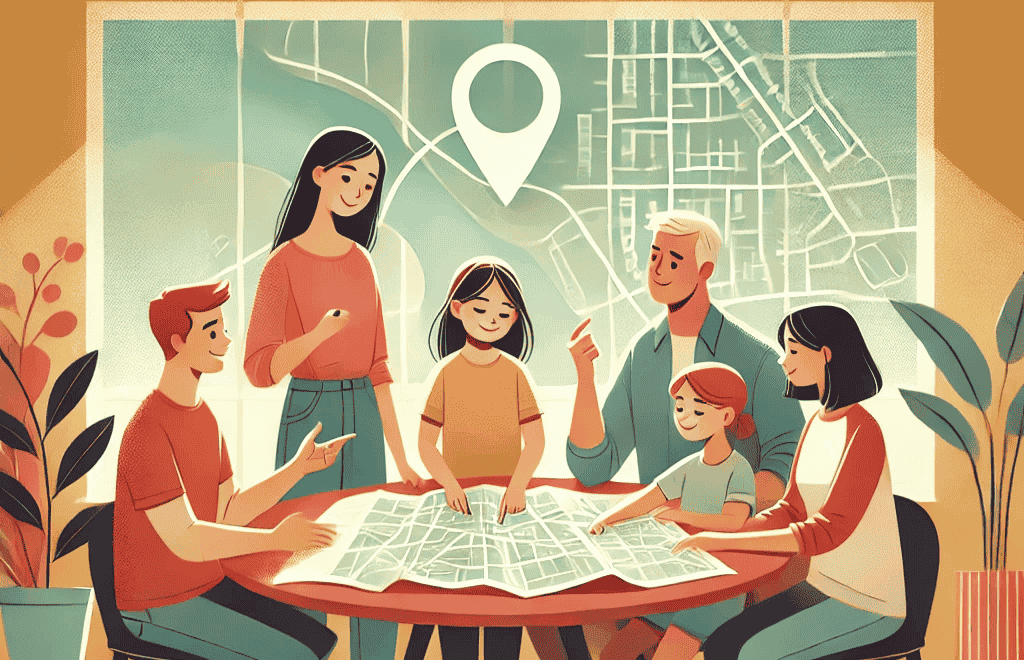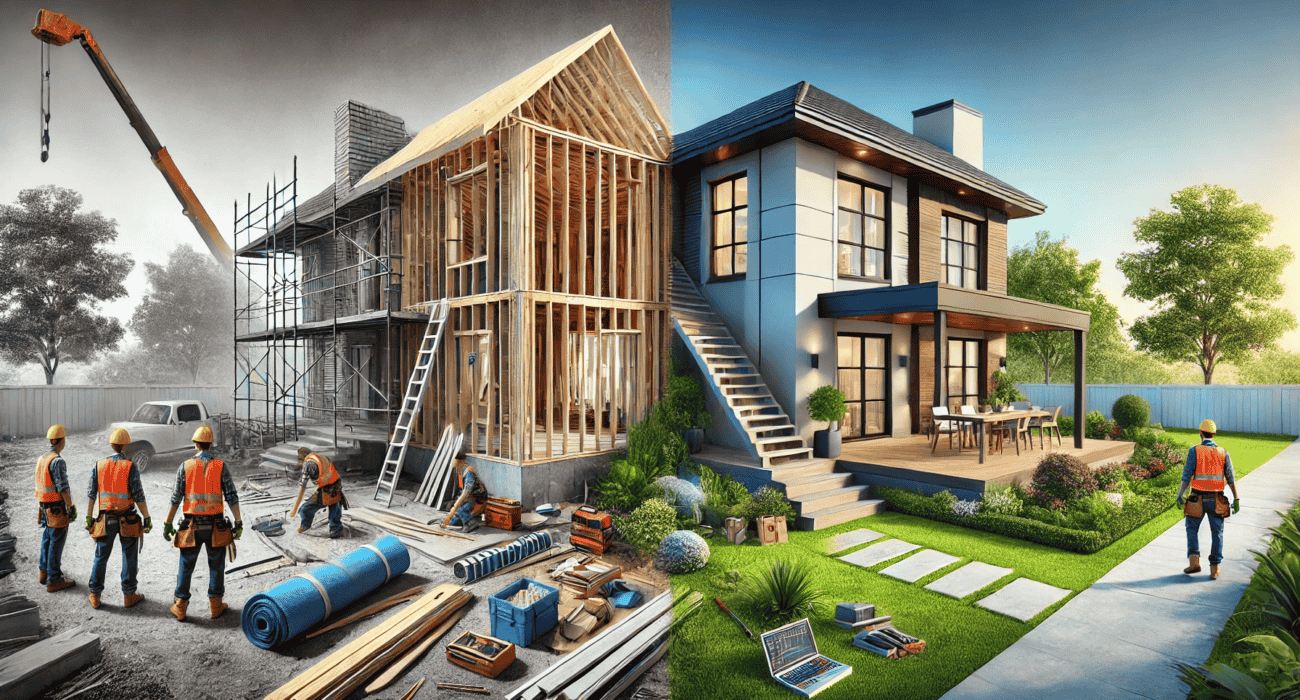Last Updated: February 27, 2025
Dreaming of your perfect home? Whether you’re imagining designing it from scratch or finding that move-in-ready house, the decision of building vs buying a house goes beyond just where you’ll live. It’s about your budget, timeline, and how much control you want over your space.
Building lets you design your dream home from scratch but may come with higher costs and longer wait times. On the other hand, buying is quicker and can be more affordable, though it might mean compromising on personalization.
Let’s get into the pros, cons, and costs of both options to help you make the right decision for 2025.
In Short
Deciding whether to build or buy a house depends on your budget, timeline, and personal preferences.
- Building: Offers customization but can be time-consuming and more expensive upfront.
- Buying: Quicker and often more budget-friendly but may lack personalization.
The Cost Breakdown of Building vs Buying a House
When deciding whether to build or buy a house, cost is a major consideration. For builders and contractors, using tools like Builtfront can streamline project management by helping track budgets, timelines, and resources efficiently. This can lead to better cost control and fewer delays, ultimately benefiting clients.
Homeowners should ensure their contractors use reliable construction management software for smoother project execution.
Cost of Building a House
Building a house gives you full control, but it comes with unique expenses:
- Materials: The type and availability of materials significantly impact your budget.
- E.g., hardwood flooring vs laminate can create a $10,000 difference.
- Labor: Contractor and subcontractor costs vary by location.
- Permits and Fees: Essential for inspections and approvals; fees depend on your local government.
- Delays: Unexpected costs arise from delays caused by weather, labor shortages, or supply chain issues.
Here’s a quick look at how costs might compare based on location:
| Scenario | Urban Area | Rural Area |
|---|---|---|
| Materials | $150,000 | $120,000 |
| Labor | $100,000 | $80,000 |
| Permits and Fees | $15,000 | $8,000 |
| Total Estimated Cost | $265,000 | $208,000 |
For more tips on construction budgeting, check out our guide on pricing strategies to optimize construction costs.
Cost of Buying a House
While buying is often faster, the true cost of buying goes beyond the house price alone, with additional expenses like mortgage rates, closing costs, and potential repairs to consider.
- Mortgage Rates: Rates fluctuate based on your credit score, down payment, and market trends.
- Closing Costs: Expect to pay 2–5% of the home’s price for appraisals, title searches, and more.
- Repairs: Older homes may require costly updates like roof replacements or plumbing fixes.
Hidden Costs to Watch For
Both options have hidden costs that can sneak up on you:
- Building: Design changes, rising material costs, or unexpected land expenses.
- Buying: Property taxes, HOA fees, and higher-than-expected maintenance costs.
Pros and Cons of Building a House
Building a house means more freedom to design your dream home, but it’s not for everyone. So, what are the pros and cons?
Pros
- Customization Options: One of the biggest draws of building a house is the ability to customize every aspect of it. From the floor plan to the finishes, you get to create a space that perfectly fits your style and needs.
- Energy Efficiency and Modern Materials: New homes are built with the latest energy-efficient technologies that can help reduce utility bills and environmental impact.
- Smart Home Features: According to research from Lawrence Berkeley National Laboratory, smart home energy management systems can help reduce energy consumption and provide significant savings over time. So integrating smart home technology from the start can save you money on energy bills and provide additional convenience and security.
Cons
- Higher Upfront Costs: Building a house typically comes with higher upfront costs compared to buying an existing home.
- Longer Timeline (Delays and Uncertainty): Building a house is a lengthy process, and delays can extend your timeline, leaving you waiting longer than expected.
Pros and Cons of Buying a House
Now, what about buying an existing home? It’s faster, but there are some trade-offs to think about.
Pros
- Faster Move-In Process: One of the biggest benefits of buying a house is the speed at which you can move in. Unlike building, which can take months or even over a year, buying an existing home means you can close quickly and move in right after the paperwork is done.
- Established Neighborhoods and Amenities: When you buy a home, you’re likely moving into a more established neighborhood, with ready-to-go amenities like schools, parks, shops, and restaurants.
- Lower Upfront Costs: Compared to building, buying a home often has lower upfront costs. If you’re on a budget or need to move quickly, buying could be the more affordable option.
Cons
- Limited Customization: A key drawback of buying an existing home is the limited ability to customize it.. While you can make changes later, it might not be exactly what you were hoping for.
- Potential for Higher Maintenance and Repair Costs: Older homes may have hidden issues, leading to potential maintenance and repair costs.
Key Factors to Consider Before You Decide

When it comes to choosing between building or buying a house, there are a few key factors to think about:
- Location and Land Availability:
- Building: If you’re set on a specific area, finding land may be a challenge, particularly in urban or high-demand locations.
- Buying: The location is already established, but it’s important to think about how the neighborhood suits your needs—think commute times, local amenities, and future growth potential.
- Long-Term vs. Short-Term Plans:
- Building: A custom home could be perfect if you plan to live in it for many years, as it will be designed around your lifestyle.
- Buying: If resale value is important, buying a home in a desirable area might be the better choice. Established neighborhoods often see faster appreciation in value.
- Lifestyle Needs:
- Building: If you have specific needs—like extra bedrooms or a larger kitchen—building gives you the flexibility to design your home exactly how you want.
- Buying: If you’re looking for something convenient, buying an existing home in a well-established area might be the best choice, especially if you need to be close to work, school, or family.
Can You Save Money by Building?
One of the most common questions is whether building a home can save you money. While it’s possible, the savings aren’t always clear-cut.
You might save money if:
- You already own land and avoid the cost of purchasing it.
- You’re building a smaller, more basic home with cost-effective materials.
- You manage the project yourself and can save on labor costs.
But keep in mind, building a home can also lead to unexpected expenses due to delays, rising material costs, or the price of land in high-demand areas.
Should I Buy Or Build A House In 2025?
So, should you build or buy your first home in 2025? The decision ultimately depends on your goals, budget, and timeline.
If you’re looking for complete control and customization, building might be the way to go. But if you need something quicker and more affordable, buying could be the better choice.
If you’re leaning toward building a home, partnering with builders who use project management tools like Builtfront can make the process smoother. Builtfront helps manage budgets, schedules, and tasks, reducing delays and keeping costs in check for a more organized, stress-free, and efficient building experience.
FAQs
Which is Cheaper, Building or Buying a House?
– Buying a house is usually cheaper than building, as building has higher upfront costs for land, permits, and materials. However, buying might involve additional costs like repairs and closing fees.
How Long Does It Take to Build a House?
– Building a house typically takes anywhere from 6 months to over a year. The timeline depends on factors like the complexity of the design, availability of materials, weather, and any unforeseen delays during construction.

